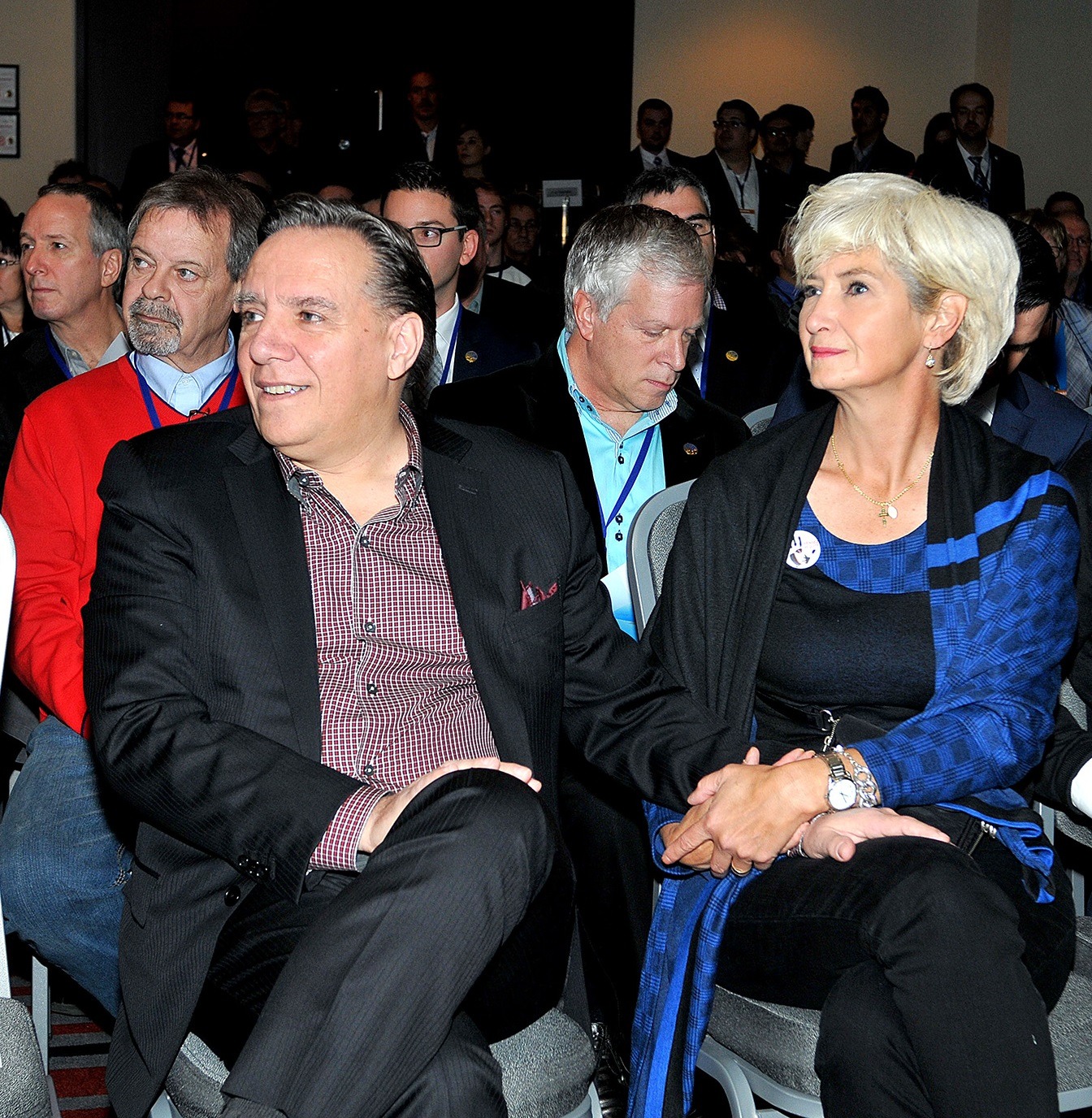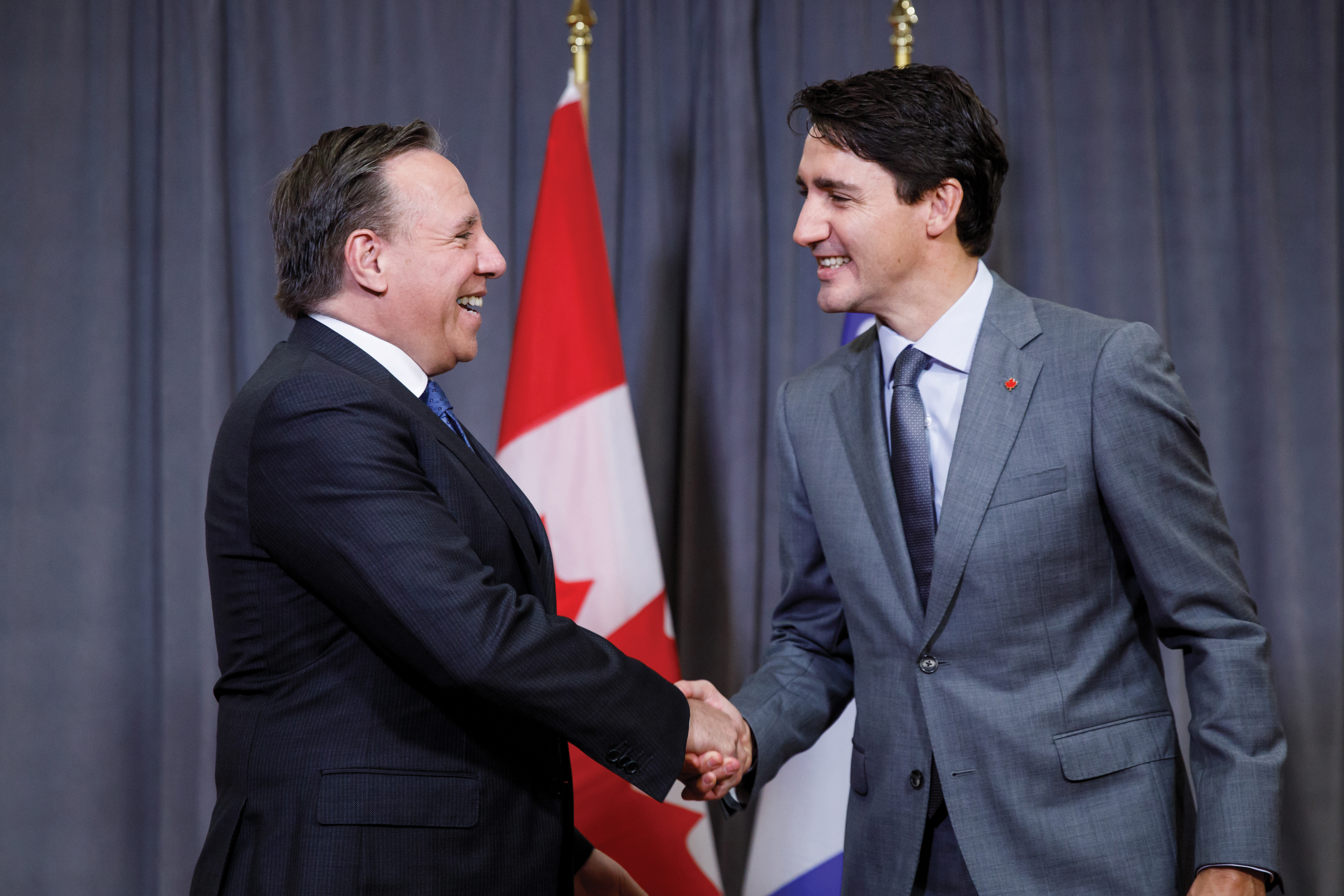The Boring Campaign that Wasn’t
By the end of its third week, it was being billed as the most boring Quebec election campaign in generations. No René Lévesque, no constitutional crisis, no sovereignty on the ballot. But by the end of election night, the narrative had clearly become more complicated than a walk in the park, and in ways that put the polling industry, again, on the defensive. Veteran Quebec observer and former official languages commissioner Graham Fraser recounts a campaign in which language and immigration became key plot points.
Graham Fraser
When François Legault, the leader and founder of the Coalition Avenir Québec (CAQ), made his way through the election night crowd on October 1, he seemed almost overwhelmed, admitting to reporters that he was surprised.
The public opinion pollsters had indicated that, after leading for a year, Legault’s CAQ had slipped during the campaign, and that the race was very tight. On September 20, CROP even predicted a Liberal victory.
But within minutes of the polls closing, it was clear that the CAQ was cruising to a majority government, ending up with 74 of 125 seats in the National Assembly and 37.4 per cent of the vote.
The election transformed the political map of Quebec. The Liberals, whose previous low water-mark still produced a river of red along the Ottawa river to Montreal’s West Island and out Autoroute 10 to the Eastern Townships, lost 3 of 5 seats in the Outaouais and were wiped out in the Townships. The oldest party in Quebec had its worst result in its 151-year history: 32 seats, and 24.8 per cent.
But the night was equally disastrous for the Parti Québécois (PQ), which finished fourth, behind the CAQ, the Liberals and the left-wing Québec solidaire, with only nine seats and 17 per cent, its lowest share of the vote ever. The party was eliminated in working-class ridings in the east-end of Montreal—losing seats it had held since 1970—in Quebec’s Lower Town, Sherbrooke and Rouyn-Noranda.
And Québec solidaire surged, winning 10 seats and 16 per cent of the vote.
PQ Leader Jean-François Lisée stepped down immediately; Liberal Premier Philippe Couillard, who won his seat, resigned as leader and as an MNA three days later.
The worst was not over for the Liberals. While Couillard resigned his seat, the Liberals also kicked a member out of caucus for having leaked information to the CAQ and the following week the PQ won a riding recount, taking another seat from the Liberals. Final score: CAQ 74, Liberals 29, PQ 10, QS 10.
It is a political truism that the Liberal Party of Quebec is the oldest party with the deepest roots and that the only way it is defeated is when a rival pulls together a coalition of all the political streams that oppose the Liberals: nationalists, conservatives, and disenchanted Liberals. Maurice Duplessis did it in 1936, René Lévesque did it in 1976, and now François Legault has done it.
On election night, Legault’s remarks were conciliatory, and the next day, at his first news conference, he stressed that the new government would have three priorities, each one in an area he was personally comfortable with: the economy (he was a former businessman); education (he had been a minister of education); and health (he had been a minister of health). It was only the following day that two of his members, and probable cabinet ministers, said that the new government would be pushing ahead with its most controversial policy: forcing government employees to forgo religious attire (crosses, kippas or hijab) as a condition of employment, with the threat to use the notwithstanding clause of the Charter of Rights and Freedoms—an echo of Ontario Premier Doug Ford’s approach to governing—if this were challenged.

It was a blunt reminder of the most difficult part of the CAQ campaign.
On September 6, Legault spoke to reporters in Saint Colomban, a small town abut 70 km northwest of Montreal on the edge of the Laurentians. Until then, the campaign had been a combination of gaffes (usually about tweets and other embarrassments that candidates had not shared with their parties) and grocery lists of ideologically indistinguishable promises: subsidized school lunches, reduced transit fares and child care fees, and improved old age homes.
But in St. Colomban—hardly a centre for immigration in Quebec—Legault expressed the concern that because of immigration, Quebec’s grandchildren might not speak French.
With this, he touched on one of the historically primal fears in Quebec society: Immigration could mean the disappearance of the French language.
Suddenly, it seemed he had seized the agenda in the most dramatic way, evoking French-speaking Quebec’s existential-nightmare fear. It evoked the song “Mommy” that Pauline Julien had recorded in 1974, which was sung in the voice of a small child who wondered why she no longer spoke French. (“Mommy, mommy, how come we lost the game? / Oh Mommy, mommy are you the one to blame? / Oh Mommy, mommy, tell me why it’s too late, too late / Much too late.”)
That same year, Liberal Premier Robert Bourassa’s Bill 22, making French the official language of Quebec, became law. In 1977, the first PQ government passed Bill 101, the Charter of the French Language, doubling down on the language protections that were inherent to its independence platform.
And 30 years ago, the late Lise Payette produced a documentary called “Disparaître” which similarly raised the spectre of the disappearance of Quebec as a French-speaking society.
Legault’s intervention produced headlines. “Immigration: Legault joue la carte de l’identité” said the front page of Le Devoir. (“Legault plays the identity card”)
There was a pundit consensus: Legault had seized the initiative and defined the ballot question, and focused attention on his determination to reduce the flow of immigration to Quebec from 52,000 to 40,000 a year.
But 10 days later, in Cap Santé—a picturesque town on the St. Lawrence between Trois-Rivières and Quebec City—he was asked by a reporter how long it took an immigrant to become a Canadian citizen.
“A few months,” Legault replied.
Actually, it is three years, the reporter corrected. It got worse. The next day, after saying he had stayed up almost all night studying the issue, he fumbled another basic question, was unable to name a bilingual province in Canada (New Brunswick is the only one) and joked that, clearly, he would not be a candidate for a high school quiz show.
But for his opponents, it was no joke. For Couillard and Lisée, it was a golden opportunity. The issue was no longer about identity—or the Liberal response—that there is a crying need for immigrants to deal with the shortage of workers—but about competence.
Lisée was merciless. “It’s not a question of being a quiz show contestant. We didn’t expect that from him. But we did expect that, on his major file, that he would know the steps to access citizenship, since he wants to play around with them. That he thinks it takes a few months to become a citizen means he is guilty of ignorance for someone who claims to be the great immigration reformer.”
Couillard joined in, arguing that by suggesting Quebec should have total control over immigration, Legault was putting existing agreements at risk. “Through his incomprehension, he would weaken Quebec’s powers.”
And that set the stage for a historic event: the first televised English-language debate between Quebec’s political leaders ever, where Couillard and Lisée continued to pound away at Legault’s promise that immigrants would have to take a French test and a test on Quebec values after three years and be forced to leave if they failed.
Suddenly, after a year with a comfortable lead in the polls, the CAQ began to slip, and it looked like a possible photo finish.
Immigration was the centrepiece of Legault’s campaign, the wedge issue that distinguished him from the Liberals, and he did not know the basics. But by bungling the details of citizenship, he opened himself up simultaneously to both Couillard and Lisée, and support seemed to drain on both sides. Since the CAQ coalition consists of both discontented Liberals and disillusioned Péquistes, this was a serious wound.
Similarly, the English debate played to both Couillard and Lisée’s strengths and Legault’s weakness. An optimistic interpretation would be that the English debate was a recognition of the linguistic security of the French-speaking majority and its ability to be generous to the English minority. A more cynical interpretation would suggest it was an effective Lisée ploy to pull Legault onto thin ice; Legault is much less articulate in English than either Lisée or Couillard, and Manon Massé’s English is weaker still.
The third debate was remarkable in that Lisée turned on Québec solidaire rival Massé and pointed out that she was not, in fact, the leader of the party but co-spokesperson. While he was criticized for his aggressiveness toward a woman who has seemed the personification of left-wing compassion, his outburst did have the effect of focusing media attention on Québec solidaire.

Two years ago, QS had overwhelmingly rejected a merger with the PQ. Lisée’s attack may have backfired. For in the final results, he was defeated in his own constituency of Rosemont in east-end Montreal, by former La Presse columnist Vincent Marissal, and the PQ fell behind QS.
But ultimately none of it mattered. What appeared to be a close race turned out to be a sweep. The CAQ won decisively in every region of Quebec—except Montreal, where the English-speaking voters remained loyal to the Liberals, Québec Solidaire increased its presence in the poor and working class French-speaking ridings in the east end, and the CAQ had a breakthrough with two ridings in the far east end of the island.
CROP president Alain Giguère was reduced to saying plaintively that people said one thing to pollsters and then did something else in the privacy of the ballot box. If it was a bad night for the Liberals and the PQ, it was a very bad night for the polling industry.
What remains to be seen is whether Legault will be as disciplined as his first post-victory prepared statement suggested. There were two veterans of the Harper PMO, Carl Vallée and Catherine Loubier, advising on the transition, and they know something about message discipline. Whether, as premier, he will articulate the darker anti-immigrant and more particularly anti-Muslim sentiments he sometimes expressed is another matter.
The Washington Post and Libération in Paris have both noticed his anti-immigrant position, Libération lumping him in with Donald Trump and Brazil’s right-wing authoritarian Jair Bolsonaro. Already, Legault has had to disavow the enthusiasm expressed by France’s right-wing xenophobe, Front National Leader Marine Le Pen, who hailed him as an anti-immigrant kindred spirit. Legault responded by saying that even with reduced immigration numbers, Quebec would be receiving more immigrants per capita than the United States or France. “On va en prendre moins, mais on va en prendre soin,” (We will take in fewer, but we will take care of them) was his catchy campaign phrase, repeated in his tweet rejecting the Le Pen support.
Now, this remains his biggest challenge, for the world is watching.
Graham Fraser is a visiting professor at the McGill Institute for the Study of Canada, and author of the bestselling René Lévesque and the Parti Québécois in Power.
